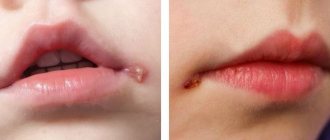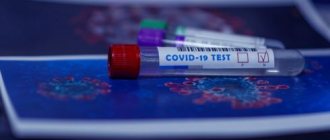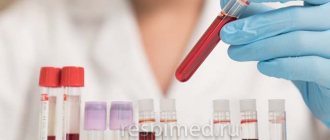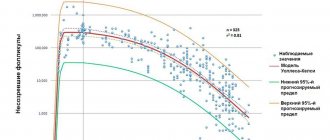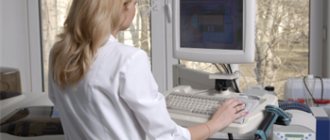Herpes test
Biological body fluids such as oropharyngeal secretions, cerebrospinal fluid, and saliva can be used as biological material for research. To prepare, you need to stop eating food 4 hours before the procedure. You should also not rinse your mouth or even drink plain water. Saliva collection is carried out only after rinsing the mouth three times with saline solution. Cerebrospinal fluid collection is carried out only by a qualified physician in accordance with current methods for collecting biomaterial.
Herpesvirus infections are a group of infectious pathologies that arise due to the activation of viruses of the same name. These pathogens can be in the body asymptomatically if the person’s immunity is normal. But in case of problems with the immune system, serious pathologies can develop, even death.
Viruses of the herpesvirus class can cause diseases such as:
- Infectious mononucleosis;
- Burkett's lymphoma;
- Hepatitis;
- Lymphoepithelioma of the salivary gland;
- Intrauterine infection of the fetus in women during pregnancy;
- Kidney damage;
- Serious liver pathologies;
- Sudden exanthema of children;
- Mononucleosis-like syndrome;
- Chronic fatigue syndrome;
- Encephalomyelitis;
- Oral and cervical carcinoma.
This research is of great importance. Knowing the concentration of herpesvirus DNA in the human body, it is possible with a high probability to make predictions about the development of a particular disease.
The main indications for analysis are:
- Examination of patients who have or are suspected of having mononucleosis-like syndrome, chronic fatigue syndrome, or immunodeficiency state;
Complexes with this research
Male infertility.
Extended examination Analysis of the state of male reproductive health 19,800 RUR Composition IVF planning Examination for preliminary preparation of a woman for the IVF procedure 9,080 RUR Composition
Examination during pregnancy. 1st trimester 10,390 RUR Composition
IN OTHER COMPLEXES
- Miscarriage RUB 29,050
- Pregnancy planning. Diagnosis of infections RUB 6,010
- Entry into IVF RUB 15,030
Decoding the analysis for Herpes
Decoding the results for the herpes simplex virus in the body has several features. You can do this yourself, but to prescribe the correct treatment tactics you should contact a specialist only. The same applies to the interpretation of results.
If during the study specific immunoglobulins of class M are detected in the patient’s body, this may indicate that the infection is in the primary stage. In some cases, this indicates that the disease has moved from chronic to active phase. If an increased concentration of class A immunoglobulins is detected, we are talking about the activity of the infectious process. In some cases, this may indicate the presence of neonatal herpes in the newborn. If class G antibodies are detected in the body, we can safely say that the person has been a carrier of the herpes simplex virus for a long time.
Also, the results of the analysis must be interpreted depending on the presence/absence of clinical manifestations. In some cases, doctors associate herpes infection with damage to the central nervous system in patients infected with HIV. However, this connection has not yet been scientifically established. In this situation, it is necessary to conduct a comprehensive examination. It is important to understand that almost all tests will have to be taken several times - under the influence of various factors, false positive/false negative results can be obtained.
Herpes. Interpretation of results
Herpes is an infection that is present in the body of most people. The vast majority of the time it remains in a passive state, but in case of weakening of the immune system and a number of other factors it can make itself felt.
When taking a test for the presence of herpes in the body, there can only be two possible results - negative or positive. If the test result is positive, this indicates that the virus is present in the body. Testing is carried out on modern equipment. The analysis determines the level of antibodies to the virus - if they are diagnosed, it means the person is infected.
If the test result is negative, this indicates that the person has never encountered the herpes simplex virus or its concentration in the body is so low that it cannot be detected by laboratory equipment. It is important to understand that if a little time has passed since the infection, a sufficient number of antibodies have not yet been developed, and the result may be false negative. In this case, it is recommended to repeat the study after 2-3 weeks.
Herpes viruses: what you need to know about them and whether you can protect yourself from infection
Briefly: 70 to 90% of the population is infected with herpes viruses. Only children under 3-5 years of age are healthy, due to rare contacts with adults; as soon as the child begins to attend kindergarten or school, he becomes infected within a short period.
Are herpes viruses dangerous: for healthy people they do not pose a particular threat, a person outside of exacerbations is not contagious, isolation is required only during exacerbations. They become dangerous for people at risk.
Examination of a child with frequent colds
If a child has frequent, severe colds and acute respiratory viral infections, our center will find out the cause of this condition
Is there a treatment: there is no specific treatment today, so do not believe promises to cure herpes. A vaccine is currently being developed that should help fight herpes. Research is underway in the field of gene therapy. And the existing vaccine “Vitogerpovac” only stimulates a specific reaction of antiviral immunity in general, enhancing the immune response, in particular the activity of lymphocytes.
In short: you can live happily ever after with the herpes virus. And now in more detail: how many herpes viruses exist, how they differ and who is at risk.
Question #1: Is it true that HSV type 1 is a common cold, and HSV type 2 is a genital cold?
Previously, it was believed that HSV 1 only causes colds on the lips and other mucous membranes, and HSV 2 is the culprit of rashes on the genitals. No, that's not true. Viruses of both types feel great on any mucous membrane. In other words: oral sexual activity during an exacerbation of herpes on the lips of one partner will lead to infection of the other.
Other herpes viruses
Type 3 virus causes chickenpox and shingles. Most often, at the first meeting in childhood, chickenpox occurs, and at an older age, with weakened immunity and other diseases, symptoms of herpes zoster appear. And, the more weakened the immune system, the more frequent and severe the relapses.
Type 4 Epstein-Barr virus causes infectious mononucleosis, most often transmitted through kissing. The peculiarity of this type of virus is that it prefers to live and reproduce in one cell. By making her “immortal,” he actually provokes oncological processes. Thus, the Epstein-Barr virus was discovered while studying Burkitt's lymphoma. Nasopharyngeal carcinoma is also closely related to herpetic exacerbations. Don’t kiss your children on the lips; that’s what their cheeks, foreheads, hands are for, and in extreme cases, their heels.
Virus type 5 or cytomegalovirus . Its maximum concentration is in urine and saliva; children in kindergartens are often infected due to insufficient hygiene skills. Basically, it is a fairly peaceful type of herpes and the initial encounter goes away like a common cold and there are no further relapses. Dangerous only for weakened people, pregnant women and HIV-infected people. There is evidence that it may increase the risks of hypertension and atherosclerosis, type 1 diabetes.
Types 6, 7 and 8 of herpes viruses are poorly studied, most likely they are the culprits of chronic fatigue syndrome and unclear rash syndrome. It is known that herpes virus 6A is common in patients with multiple sclerosis.
Important : a person poses the greatest danger during primary infection; later, during periods of exacerbation, the risk of infection is much lower. However, in many people the disease manifests itself only once. And the larger the area of the rash, the worse the immune system works. There is another feature of herpes viruses - it only affects skin and epithelial cells. Typically, relapse occurs at the same site where the initial infection occurred.
Risk factors (or what triggers relapse):
- Temperature fluctuations and sudden climate changes are why herpes often appears in the off-season and after flights.
- Overheating and solar insolation (for people who are susceptible to frequent relapses, it is better not to sunbathe, avoid visiting baths and saunas
- Emotional stress (breakup, interview, exam)
- Physical overexertion (intense physical labor or sports)
- Local injuries, surgeries, skin damage
- Disturbances in the rhythms of life: lack of sleep, fasting or overeating, large amounts of alcohol on the menu.
Herpes is often triggered by menstruation, appearing either on the lips or like herpes zoster, but in the lower back and buttocks.
What is the danger of herpes viruses
Previously, it was believed that a herpetic rash was only an aesthetic defect, and a healthy person need not fear for his condition. Not at all. The herpes virus lives in nervous tissues; the connection between most chronic diseases of the nervous system and viruses has already been proven - Alzheimer's disease, multiple sclerosis and others. There is a close connection between liver damage and herpes viruses - the fact is that some viruses are imperfect and can only penetrate a cell that is already infected by another virus. That is, at the time of relapse of herpes, a person is more susceptible to other viral infections. It has already been proven that the herpes virus is often to blame for infertility of couples - it affects sperm, although both the man and the woman are reproductively healthy - pregnancy does not occur.
The main danger of herpes viruses: they activate and increase the likelihood of infection with other viruses, which in turn reactivate herpes, starting the process of constant relapses. In particular, such a relationship has been confirmed between the herpes viruses and HIV. This phenomenon is called epidemiological synergism, that is, herpes practically opens the gates to other viruses.
That is, even groups of relatively healthy people who do not have frequent relapses cannot be safe. Today, a connection has been identified between the presence of herpetic complications and certain genes.
Who is at risk or who is more likely to experience relapses and severe herpetic complications:
- Patients with primary and secondary immunodeficiencies (for many of them, herpes infection can become fatal, becoming generalized).
- Pregnant women (firstly, the woman herself is more susceptible to infection, and any illness during pregnancy is less tolerated, and secondly, there is a risk of herpetic damage to the fetus and congenital anomalies).
- Premature babies, newborns with developmental defects or low birth weight
- Patients receiving chemotherapy, taking drugs for the treatment of autoimmune and oncological diseases, antibiotics.
- Patients with bacterial pneumonia.
- Donors immediately after donation, people after blood loss and immediately after transfusion of blood and/or its components.
- Persons who have frequent promiscuous sex life (lack of a condom, low degree of its protection against herpes, if the virus affects the skin, the high contagiousness of the virus contributes to its rapid spread)
- People with tuberculosis, atopy, connective tissue diseases.
- Patients after surgical interventions - often herpes worsens even after cosmetic and dental procedures, since the nerve cells in which herpes lives are injured.
- Patients after organ transplantation.
- People over 65 years of age.
- People of certain professions: laboratory assistants, virologists, astronauts, miners, radiologists, dentists, pilots, coal industry workers, etc.
Symptoms and treatment
Symptoms of exacerbation can manifest themselves in different ways: from completely insignificant (when there is only a single element) to complicated - with a rise in temperature to high numbers, symptoms of intoxication. It is important which herpes virus caused the disease or complication. Now we are talking about the classical forms of HSV 1 and HSV 2.
You need to understand that regardless of the symptoms, at this moment you are very contagious and elderly people, patients with immunodeficiencies who happen to be nearby can receive their dose of the virus. At the same time, if you or your loved ones are at risk, then it is better to protect yourself and wear sterile masks.
- During an exacerbation, avoid cosmetics and creams - along with them, you “smear” the virus over the skin and mucous membranes.
- Do not touch your eyes and other mucous membranes - this will lead to infection (be sure to wash your hands before using the toilet, eyes and genitals).
- Change towels, or better yet, use disposable ones.
- Drink only from your own glassware, wash it separately or in the dishwasher
- Do not peel off the crusts or burst the bubbles.
- Use products for external use - they soften the skin well and promote rapid healing.
If there are symptoms of intoxication, high fever, herpetic rashes, call a doctor at home.
How to test yourself for herpes viruses
If you are over 18, you are most likely already infected. You can get tested for antibodies, do PCR diagnostics, an increase in immunoglobulins, of course, is also an indicator - but they increase in response to almost any infection.
What should I do if I am infected?
We said above that if you are over 18, then most likely you are infected. The main thing is not to fall into risk groups, avoid provoking factors, and lead a healthy lifestyle. You can make an appointment with an immunologist and check the risks of cancer and other pathologies for which a gene-disease relationship has already been identified, and follow the news to be the first to know when a cure for herpes is found.
You can undergo such diagnostic examinations at our center named after. Speransky. Our doctors adhere to the rule: the main thing is to preserve the health and natural strength of the body, and not to heal the patient until, according to tests, everything is perfect.
Tests for coronavirus
- Test for coronavirus
- Coronavirus test for organizations
- Testing for coronavirus at home
- Testing for coronavirus at home in 12 hours!
- Testing for coronavirus in Lyubertsy in 12 hours!
- Testing for coronavirus in Nekrasovka in 12 hours!
- Testing for coronavirus in Korolev in 12 hours!
- Test for coronavirus on the Sokol metro station
- Coronavirus test at Kolomenskaya metro station
- Coronavirus test at Voykovskaya metro station
- Test for coronavirus in Nekrasovka
- Coronavirus test in Korolev
- Test for coronavirus in Lyubertsy
- Test for coronavirus in Mytishchi
- Test for coronavirus at home Mytishchi
- Test for coronavirus at home Korolev
- Test for coronavirus at home Lyubertsy
- Test for coronavirus at home Nekrasovka
Any tests can be taken at clinics in the East Clinic network.
References
- Clinical guidelines “Herpes simplex (HS) in adults” approved. Ministry of Health of the Russian Federation, 2021. - 31 p.
- Belyaletdinova, I.Kh., Golosnaya, G.S., Mitrofanova, I.V. and others - Clinical and laboratory characteristics of encephalitis caused by the herpes simplex virus in children. - Treatment and prevention, 2021. - No. 4 (20). — P.64-68.
- Khryanin, A.A. Herpes under the pillow. Prevalence of herpes simplex virus in the Russian population: long-term monitoring. – STATUSPRAESENS. Gynecology, obstetrics, infertile marriage, 2013. - No. 6. — P.69-76.
- Mathew, J., Sapra, A. Herpes simplex type 2. - StatPearls Publishing, 2021.
Comprehensive treatment of herpes
There are now highly effective antiherpetic drugs that kill the virus, and the first was acyclovir in 1977. He made a revolution in treatment, but he failed to completely kill the virus, like all the drugs synthesized after acyclovir. And yet, medications for herpes can significantly reduce the duration of the disease and its clinical manifestations. With constant use of acyclovir, you may not have relapses of herpes, but after the end of therapy, a relapse may develop in the near future, and its intensity will be higher than before treatment.
The tablets are effective in combination with local treatment; for the first episode, the duration of therapy is 7–10 days; for relapses, drugs in medium doses are taken for 5 days, in high doses – one to two days. An uninfected partner needs prophylaxis, but you should not refuse a condom; during the period of herpes manifestation in your partner, avoid sexual contact. Suppressive therapy for herpes (prophylactic, preventative) is aimed at preventing relapses, it is carried out for months and only under the supervision of a doctor.
Morbidity
According to Russian statistics, every year out of a hundred healthy adults, five are infected with genital herpes, the estimated incidence is 17 people per 100 thousand population, but only estimated, because those who have been ill for a long time suffer from relapses without the complicity of a doctor, relying on habitual self-medication. In the Urals and the Russian North-West, herpes occurs twice as often as the Russian average.
There are patients who suffered one or two episodes of herpes, and after many years did not remember the disease - this is a subclinical form favorable for the carrier. However, they can be a source of infection to a healthy sexual partner.
How does the virus get inside?
All herpes viruses are very tenacious, they easily tolerate low temperatures, even -70 degrees, they survive for a day in the microclimatic environment of an ordinary room, they tolerate very hot water for half an hour. On coins and door handles they can be kept alive for up to two hours, and on plastic for three hours. Therefore, it is easy to become infected with herpes not only through contact with the “sore”, but also through secretions on underwear and through airborne droplets from saliva. In terms of contagiousness, the herpes virus is much more dangerous than HIV.
The herpes virus clings to a human cell, sheds part of its shell and rushes lightly to the nucleus. Before drilling through the shell of the nucleus, it sheds the remains of the capsule, and completely naked DNA is introduced into the nucleus, where it begins to reproduce. Before leaving the cell, the virus assembles itself in the reverse order, starting with the synthesis of a copy of DNA, then concocts a nucleocapsid from available materials, and uses the nuclear envelope of the cell to synthesize a nutritious protein solution and assemble a protective upper capsule.
The herpes virus will never leave the body, but it will respond to medications. Herpes hides in the nerve ganglia, where it sleeps and does not reproduce. At the slightest provocation, it becomes active and migrates into the cells of the mucosa, where it multiplies rapidly. A rare feature of the virus is the ability to infect another person in the absence of skin manifestations, sometimes this occurs between relapses that occur with severe skin damage, and sometimes even in people who have never been sick and do not even suspect that they have the virus.
